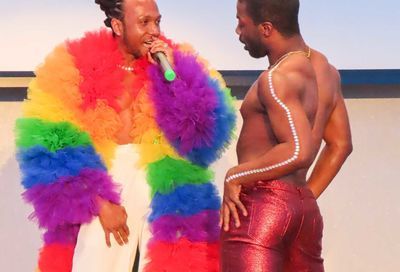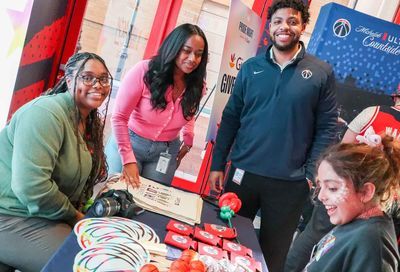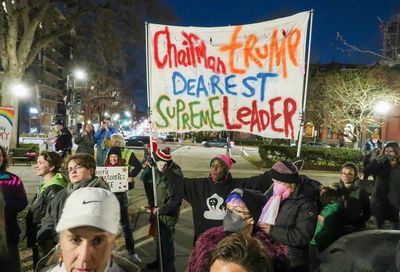Blasphemy in Idaho
Woolly Mammoth's latest offering, ''Bright New Boise,'' is a respectful exploration of faith that goes down as easy as manna from heaven
Whatever the purveyors of the nation’s entertainment may believe, or not, there is something about the recent tide of religious fundamentalism that has them running scared. With the issue of tolerance versus opinion so thorny and ill-suited to the dumbed-down parameters of the average TV show or movie, there’s little question of engaging. It’s far easier to remove every utterance of ”Jesus H. Christ” from the script of a cop thriller than it is to craft a cogent argument that tolerance also includes the taking of a deity’s name in vain.
It is in this context that Samuel D. Hunter’s A Bright New Boise shines like a beacon in the night. Intelligent, amusing and utterly unafraid, Boise deftly and without fanfare, provides a long-overdue sanity check. Whether you agree or disagree with Hunter’s many and varied messages on the mores of modern American life, it is without doubt, a rare and liberating experience to see religion treated without the usual kid gloves. Amazingly, absolutely nobody bursts into wrath-induced flames.

A Bright New Boise
(Photo by Stan Barouh)
Foremost a starkly (and often comic) human drama, Hunter’s storytelling is just as powerful as his truth-seeking. With ripped-from-the-headlines verity, events begin with Will, a middle-aged refugee from a recently imploded evangelical church. Recovering from a failed ”rapture,” Will has travelled south to Boise, Idaho, to take a job with a big-box craft store where he hopes to connect with one employee in particular: a son long ago put up for adoption.
With the soulless confines of the store’s fluorescent-lit break room and the gloomy parking lot in silent comment, Will discovers that navigating his way into Alex’s life, a life changed forever by Will’s choices as a father, is more precarious than expected. As the delicate balance of Alex’s life begins to rupture under Will’s well-meaning but unsettling influence, Will is forced to confront himself and all he believes in.
Tightly yet sensitively directed by John Vreeke, the play is superbly cast. In the role of Will, Michael Russotto skillfully and memorably captures a shaken man, treading lightly, who nevertheless carries the quiet, somewhat mysterious conviction of the true believer. Crucially, he gets and delivers Hunter’s need to keep this man likable and human. As events unfold, Russotto expresses with much subtlety the confusion and uncertainty that begin to grip Will (even if his disdain for materialism feels more liberal than evangelical). The combination of Hunter’s thoughtful crafting of this character and Russotto’s textured and dimensional performance give Will a lasting and provocative resonance.
Playing superbly against Russotto’s often-bewildered father, Joshua Morgan gives young Alex a believable and compelling awkwardness and vulnerability, even when played for laughs. His volatility and emotional frailty are palpable and Morgan keeps well away from the trite and predictable while evoking this unanchored boy. As Leroy, Alex’s older brother and fellow store employee, Felipe Cabezas nicely delivers some of the funniest lines, but also brings a dark, electrical energy to a mildly rebellious man driven, not always nobly, to protect his little brother and his own adamant views.




To Nov. 6
Woolly Mammoth
641 D St. NW
Tickets
$30-$67.50
202-393-3939
woollymammoth.net
Embodying her downtrodden employee Anna with humor and pathos, the ever-engaging Kimberly Gilbert keeps her vaguely Asperger’s girl on the right side of caricature, even if Hunter perhaps gilds her awkward lily. As foul-mouthed store manager Pauline, Emily Townley brings the comic goods, though it must be said that the swear words don’t quite roll with the flow of regular use.
Though the stellar cast could have made magic on an empty stage, the mood is nonetheless beautifully set, in all its desolation, with the spare but evocative sets, lighting, and sound design of Misha Kachman, Colin K. Bills and Chris Baine. The atmosphere is only enhanced by the quietly brilliant Michael Willis and Michael Glenn endlessly and monotonously delivering the corporate message on the break-room TV.
Without doubt, for those who remember the days before ”blessed” replaced ”lucky,” Boise is manna from heaven.
Support Metro Weekly’s Journalism
These are challenging times for news organizations. And yet it’s crucial we stay active and provide vital resources and information to both our local readers and the world. So won’t you please take a moment and consider supporting Metro Weekly with a membership? For as little as $5 a month, you can help ensure Metro Weekly magazine and MetroWeekly.com remain free, viable resources as we provide the best, most diverse, culturally-resonant LGBTQ coverage in both the D.C. region and around the world. Memberships come with exclusive perks and discounts, your own personal digital delivery of each week’s magazine (and an archive), access to our Member's Lounge when it launches this fall, and exclusive members-only items like Metro Weekly Membership Mugs and Tote Bags! Check out all our membership levels here and please join us today!




















